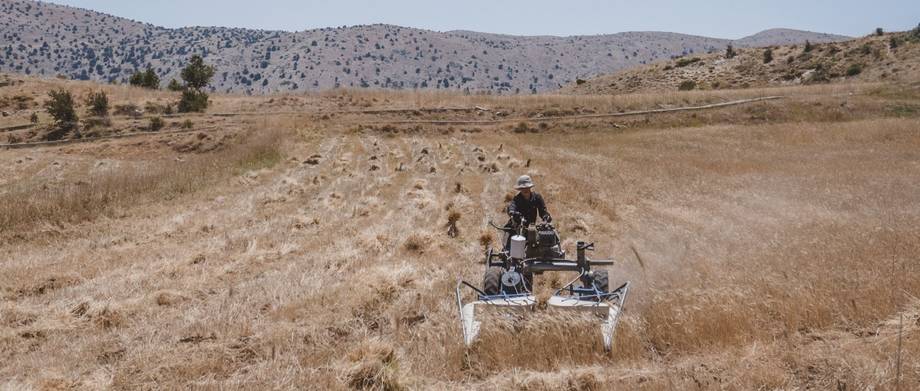The Food and Agriculture Organization of the United Nations (FAO) developed the farm business school approach to help farmers learn how to manage their farm operations, respond to market demand and make their farming enterprises more profitable. FBS is a curriculum-based extension approach, which aims to promote market-orientation and “farming as a business”, through a shift in focus from increasing production to improving farm management and profitability.
In the town of Zawtar El Sharkiyeh, in South Lebanon, Afaf Qaddouh spends most of her time in her land amid fields of Za’atar (Oregano), tomatoes, cucumber, and melons. Walking next to her silvery-leaved olive trees, Afaf looks happy and satisfied. “I come here not only to work but also to enjoy my time in nature so I can come back home relieved and relaxed”, she said.
Lebanon suffers from a serious deficit in its domestic production of essential food supplies, so it currently strongly depends on imports, particularly of animal products and cereal crops (75 to 80 percent). Production capacities worsened after the conflict of July 2006. In particular, the dairy sector - mainly goat ans sheep milk - has been exposed to several constraints over the last decade, with producers experiencing reduced income and losses due to a combination of factors: several years of conflict, meagre resources, unhygienic practices, lack of experience and low level of skills.
Ali, a 63-year old farmer from Nabatiyeh, has been cultivating his land for more than 40 years. He has never lost his determination, even in 1983 when he stepped on a landmine in his field and became permanently disabled.
Agriculture is the only source of income for Ali and he dedicates every day to his fields. He cultivates rain fed crops in winter and irrigated crops in summer. For the summer crops, Ali used to use gravity, an old and ineffective irrigation method, until he heard from other farmers about FAO's project "Development of Water Management in the Caza of Marjeyoun".
Livestock keeping is the mainstay of Lebanon’s rural economy and has a significant impact on rural well-being and poverty alleviation, particularly in areas bordering Syria. This subsector generates significant household income through sales of live animals and/or dairy products. Many people, mainly youth and women, are involved in animal care and milk processing. In 2015, the Food and Agriculture Organization of the United Nations (FAO) carried out a vaccination campaign in Lebanon to control the spread of TADs.
The massive influx of Syrian refugees has created a substantial increase in the demand for food, including affordable sources of protein such as eggs. This further deteriorated the food security status across Lebanon which, coupled with shrinking economic opportunities, more expensive goods and services, and rising insecurity, has put a strain on vulnerable Lebanese households and challenged their capacities to meet the most basic food needs.
Lebanon is distinguished, in the Arab world, by a natural wealth of forests, timberlands and water. In 1965, it was estimated that 35% of the Lebanese territories encompassed forests areas.
Yet, Lebanon suffered from the alarming advance of environmental degradation, caused by two decades of civil war and the subsequent rapid economic and population growth that placed increasing demands on the country's natural resources. The population, in fact, continuously exploited trees and forests and inflicted serious damage to the country's fragile environment.
Serving as the national emblem of the country, the cedar tree has always been the representative and main symbol of Lebanon in various forums around the world. The mountains of Lebanon were once shaded by thick cedar forests and the cedar tree was important to various ancient civilizations. Over the centuries, cedar wood was exploited by the Phoenicians, the Egyptians, the Assyrians, the Babylonians, the Persians, the Romans, the Israelites and the Turks. Time, along with the overexploitation of the Lebanese Cedar has resulted in the depletion of most of the mountains of Lebanon leaving only a few scattered stands.
Efforts conducted for the development of an Agriculture Information System in Lebanon goes back to the 1950s when was established the Bureau of Agricultural Economy within the Ministry of Agriculture. In this context, the availability of such an Information System is important for the conception and implementation of agricultural and rural development strategy and policy.
In the last few decades, the notable increase in trade of agricultural commodities between countries, as well as the variable means of the exchange of agricultural products between countries around the world has led to the spread of transboundary pests and diseases.
Many of these transboundary pests and diseases have good adaptive capability for the new environment. They could rapidly reproduce and impose a serious threat to the agricultural crops in the new environment with lack of specialized control measures and tools that should be often developed or introduced to this new environment, such as bio-control agents.

